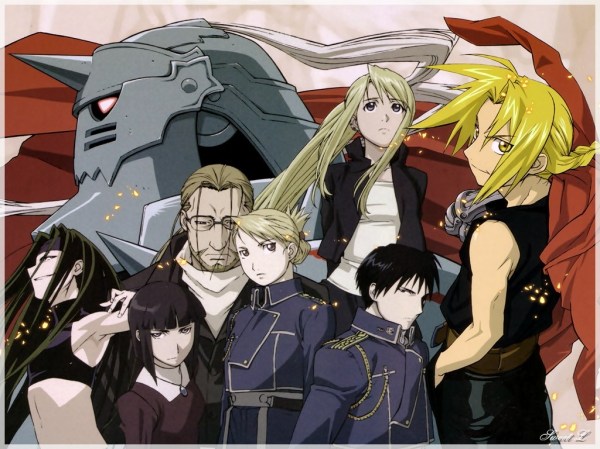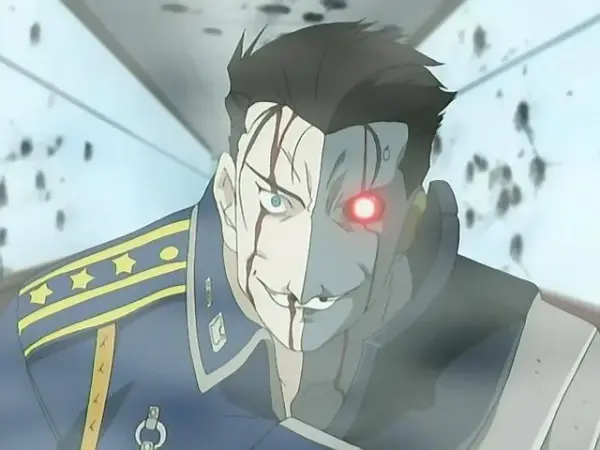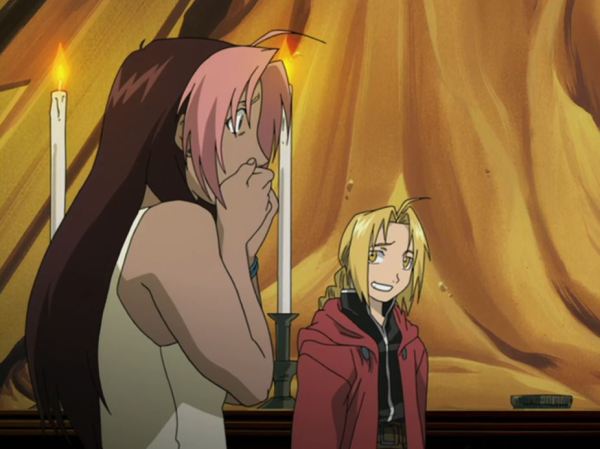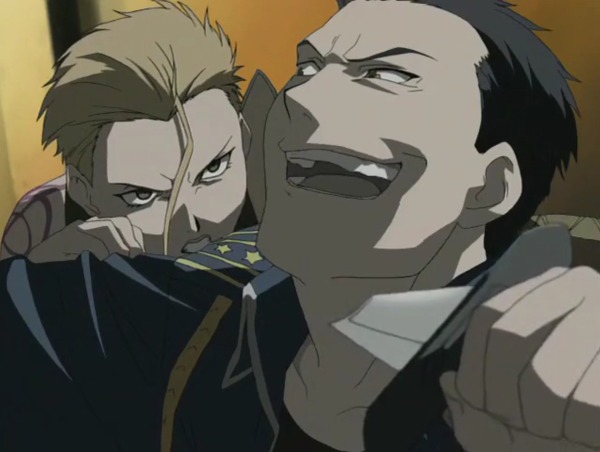It is Weebsday, my dudes! This week’s question is all about Bush-era political commentary in anime. I guess it’s what the 2020 holiday season deserves.
I recently rewatched FMA03 and was struck by how well much of it’s politics still holds up/is relevant. I’m curious what you think about 03’s politics especially it’s allegories to real world conflict. – @JulianMorein

Fullmetal Alchemist 2003 is one of my favorite anime of all time. Nothing special about that opinion; it’s like saying SpongeBob SquarePants is one of my favorite cartoons, which is also true. I could toss a rock out my window and hit someone who feels the exact same way—or at least, I could have a decade ago. Nowadays, that poor concussed pedestrian would probably append one word to the name of their favorite anime: Brotherhood.
I can’t help but wonder how many of today’s weebs have even seen the first anime adaptation of Fullmetal Alchemist. Slowly but surely, both Hiromu Arakawa’s original manga and the anime remake produced to hew closer to that source—2009’s Fullmetal Alchemist Brotherhood—have been replacing FMA 03 in the popular zeitgeist. It’s weird to think that one of the most successful and acclaimed anime of its decade has already been supplanted by a remake that began before the ’00s ended, but I do understand why the rawness and cynicism that overwhelmed FMA 03’s last half would fall quietly out of favor compared to the more adventurous and hopeful Brotherhood. Anime fandom has become much more mainstream these days, and everything that made FMA 03 popular is still present in Brotherhood, with most of its controversial edges safely sanded off.

But I remember. How could I forget The Terminarcher? How could I forget my high school’s water-cooler discussion of the show suddenly mutating into uncomfortable teenage debates on the Thule Society?
I think FMA 03’s galaxy-brain additions like The Other Side of the Gate are mostly summoned in whispers these days, rumors of some freaky mirror universe where Hohenheim knew Winston Churchill for some reason. In retrospect, it’s absolutely wild to me that director Seiji Mizushima and writer Shou Aikawa got away with so much politically provocative stuff in a prime time hit like this. Fullmetal Alchemist was not a late-night anime! Children watched it on weekend afternoons like they watch My Hero Academia today! Brotherhood’s ultimate direction is more sensible—it remains rooted in fantasy, everyone finds a fitting redemption, and good triumphs over evil. The 2003 anime is not the version of FMA for everybody anymore, but it’s the version of FMA I fell in love with. The show’s fearless embrace of sensitive topics and unanswerable questions was always a feature for me, never a bug.

But if you don’t remember FMA 03 being all that “political”, you’re not alone. Ultimately, I think FMA stays high-concept enough to act as a Rorschach test for the beliefs of fans across a wide spectrum, especially since “there are no concrete solutions for life on this bitch of an earth” is one of the intended messages. Even when the series ends by dropping its hero off to develop rocketry in 1920’s Munich, you could handwave FMA 03’s real-world parallels in many different directions, but if I start going in on its Archie Bunkerism now, I’ll be here all day.
At this point, I’m gonna have to assume you’re already somewhat familiar with the United States’ invasion of Iraq in 2003 and the tragedies that followed. I don’t feel more equipped to explain the Iraq War than Wikipedia, and my word count is already doomed to spin out of control as usual. While support for the War on Terror grew in the States, Japan was just one of our many international neighbors to widely disapprove of it, and FMA’s writing team had current events firmly in mind when detailing the fall of Liore in their anime’s last quarter. I wouldn’t say Fullmetal Alchemist is unique in its characterization of the conflict, but it’s gotta be the first foreign work of Iraq War criticism to become wildly popular in the States—even if its fantasy framing kept many fans from picking up on those parallels.

At the start of the series, Ed and Al expose an alchemist posing as a priest in the formerly impoverished city of Liore. The sun-god-fearing citizens have been thriving with the help of Father Cornello’s “miracles”, and the state military wants to prevent an insurrection building under his influence. Edward traveled to Liore on assignment as a state alchemist, but the 15-year old doesn’t actually care about enforcing the state’s authority. He only wants to expose Father Cornello for personal reasons, suspecting that the fake priest has discovered the Philosopher’s Stone that Ed could use to restore his brother’s lost body. Edward and Alphonse don’t believe that they’re fighting on behalf of the power-hungry military or the ignorant Liore denizens, only for their personal redemption. In the process, Ed relishes in flaunting his atheism and prodigious scientific knowledge before believers like Rose who’ve been putting all their hope in their faith. Ed’s not wrong to overthrow the duplicitous Father Cornello, but his brother Al (and the audience) can sense that his self-righteous adolescent cynicism isn’t helpful to the suffering populace, either. Edward ultimately leaves a weeping Rose behind to clean up the fallout of his act of “salvation”, telling her only to move forward under her own will from now on.

Soon after, Edward learns more about the war in Ishbal that defined the careers of state alchemists in the generation before him. Ishbal’s own insurrection curiously mirrors his experience with Liore, but it all ended much more tragically. With the support of the state, alchemists tried to bring their mystical flavor of science to the people of Ishbal, but the Ishbalans considered alchemy blasphemous, leading to civil unrest and occasional outbreaks of violence. After one soldier accidentally shot an Ishbalan child, this unrest exploded into all-out war, and state alchemists were sent in to exterminate the Ishbalans and raze their country to the ground. Left without a home, the remaining Ishbalans live in hiding across a series of camps and slums in Edward’s now-expanded home country of Amestris. Edward is shocked to learn about this tragedy at first, but he concludes that the war was no one’s fault, just another senseless footnote in the cycle of violence. It helps that a survivor of the war, an Ishbalan terrorist code-named Scar, has been vengeance-killing state alchemists in the name of Ishbal, which Edward views as equally bad.

Replace bringing “alchemy” to supposedly less-developed nations full of brown people with bringing “democracy”, and you can probably see where this parallel is going. Unbeknownst to Edward, the military rushed into Liore after Cornello’s fall to quell the fighting between believers and non-believers—by murdering both in equal measure. The truth about Ishbal was also vastly different from what Ed’s fellow alchemists had told him. Ishbalans already knew about alchemy, and their alchemists had mastered their own techniques long before the military invaded. It was considered a heretical practice, but Ishbalan alchemists arguably had more knowledge on the subject than Amestrians—at least, they knew how to make a bigger Philosopher’s Stone. And that accidental shooting of an Ishbalan child? That was the cover story for a far more inflammatory act of war the state committed, when they sent a special ops team to murder many of Ishbal’s unarmed religious leaders in the night, and took advantage of the ensuing chaos to invade and instate their own narrative the following day. Amestrian propaganda would have you believe these people need to be saved from their backwards religious zealotry, but the state has clearly been starting wars unprovoked for its own reasons—the Fuhrer wants the same thing Edward wants, and the boy’s service, however half-hearted, has only been bringing his troops closer to it.

When Edward meets Scar in Liore, the pieces start falling into place. Scar plans to use Ishbalan alchemy to turn the thousands of invading Amestrian soldiers into a Philosopher’s Stone—but that’s also what the Fuhrer wants him to do. Sure, he would rather sacrifice impoverished brown foreigners to acquire the Stone—a supposed weapon of mass destruction that could become an elixir of life in his master’s hands—but he doesn’t mind throwing his own troops into the meat grinder instead if it gets the job done. The Philosopher’s Stone is the only thing that the state cares about, and you can only make a Philosopher’s Stone by sacrificing a warzone’s worth of human lives. That’s not to imply that Amestrian soldiers are harmless pawns in all of this. Psychopaths like Frank Archer and Zolf Kimbley are quickly promoted to positions of power for their readiness to sacrifice lives in Liore. There’s plenty of human cruelty to exploit on the battlefield before you even get to the more monstrous conspiracies at the top, but the truth is that there were never two sides to this war. It’s just systemic racism and poverty being exploited by men (and women, shout out to Dante) at the top out of bottomless greed. Ed never thought his personal search for the Philosopher’s Stone would affect the world in such a hellish way, but after Scar gifts the completed Stone to Edward in the form of his own brother, Ed is forced to accept the responsibility of living with the compromised reality at the end of his childish dream.

While FMA 03 is never gauche enough to reference 9/11 or the Iraq War directly—even after Ed travels to our world, the furthest he sees into the future is the invention of the atomic bomb—it’s hard not to see the Bush years reflected in Ishbal and Liore. Even the nuances of how Amestris characterizes their warmongering to citizens versus the crass truth behind American (uh, I mean Amestrian) hegemony just east of where the white people live rings uncomfortably true to history. It’s a massive topic to tackle, so Fullmetal Alchemist spreads its commentary nice and thick across dozens of characters and subplots with their own perspectives and conclusions to compare. In terms of how I think it “holds up”, I could spend hours discussing where an Iraq War reading of Liore succeeds or fails, but FMA 03 is such a chimera of diverse influences that I don’t think it’s fair to judge it as pure allegory, even if the show’s ultimate WWI setting makes it clear that Mizushima and Aikawa did hope viewers would draw real-world parallels. Fullmetal Alchemist is its own fantastical story with its own context that was inspired by current events, but certainly not defined by them. It tells that story with a great depth of humanity and unflinching criticism of the frequent intersection between war and science in a world where people in power are always motivated by deadly sins.
Turning from the geopolitical back to the personal, I was most struck on rewatch by how the War in Liore affects Edward. I think that message about accepting personal responsibility in circumstances that seem beyond your control has aged extremely well. Ed has no desire to aid the military in any way, and he justifies his enlistment by seeing himself as the one using them, but he’s always been living off of privileges afforded to him by the state’s subjugation of less fortunate people. Every little decision Ed makes under the state’s authority has state consequences, even if he’s pursuing the Philosopher’s Stone for his own reasons, and even if he thinks he’s helping people along the way. Ed learns that wars aren’t just something that happen to soldiers in faraway dangerous places that have nothing to do with him, especially when he passively benefits from those wars. They might think they’re only looking out for each other, but the Elric brothers’ good intentions and rational motives can easily be exploited for national interests, just like so many bright-eyed scientists have been used before them.

Edward does get the Philosopher’s Stone, but he certainly didn’t earn it through his own efforts, and it comes at a human cost that makes him unwilling to accept it. You and I will probably never receive such a cursed gift at such a grave price, but it’s true that growing up means accepting personal responsibility for what your society has given you, even if it’s not something you chose or even believe is right. Because even if you pretend that the state of the world has nothing to do with you and your dreams, your choices will still impact the people around you, usually in ways you never intended. Fullmetal Alchemist 2003 drives home that for as long as you’re alive, you can’t opt out of participating in the world, broken and unfair though it may be. I think that’s a worthy message in a year where personal accountability and community support have become more vital than ever.
You can submit your own questions for Weebsday Q+A on Ko-Fi here! Thank you for your support. ❤

This was a really informative & enjoyable read!
LikeLiked by 1 person
Super cool look at one of my favourite anime! Thanks!
LikeLike